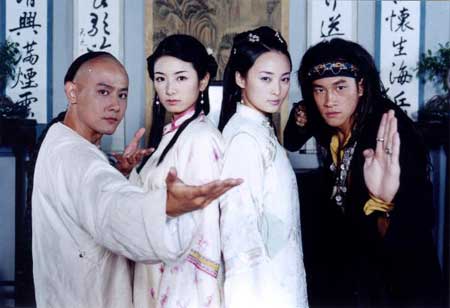 |
| 中国武侠连续剧在西方日益受到大众的欢迎。 |
|
Chinese wuxia series are becoming increasingly popular in the West in a similar fashion to Western TV shows gaining audiences in China, thanks to devoted fans and the power of the Internet. Wuxia, which translates as "martial hero", is a genre of Chinese fiction related to martial artists. It appears in various forms, from video games to movies - such as Ang Lee's highly acclaimed Crouching Tiger, Hidden Dragon. On an average weekday, 20-year-old Jonathan Breedveld, who lives in the Netherlands, grabs snacks from the fridge the minute he arrives home, carries them to his desk, turns on the computer and continues where he left off the day before - with the latest episode of the adventure series Guai Xia Yi Zhi Mei. Breedveld, a self-professed wuxia fanatic, does not watch the show on TV. Instead, he watches it on the Internet through Web-streaming sites such as YouTube. "I don't speak Chinese, and I absolutely cannot read Chinese, except for the words kung fu," he said. "I want to learn it. I think it's a beautiful language, but I don't mind reading subtitles. I can read very fast." Breedveld said his first wuxia film was Jackie Chan's Forbidden Kingdom. "While googling Liu Yifei (one of the actresses from Forbidden Kingdom) on the Internet, I discovered that she played in the series Return of the Condor Heroes," said Breedveld. "I watched one episode and was immediately hooked." Having fallen in love with the genre, Breedveld then discovered Wuxia Edge, a website dedicated to sharing wuxia TV series on the Internet. The brainchild of Susanna Liang, a Chinese Web designer who lives in the United States, Wuxia Edge features translated wuxia media links, and a blog about everything related to the genre. Liang started the website a few years ago but it did not take off until late last year. "A few years ago, I discovered a wonderful show - Chinese Paladin," said Liang. "It blew me away. I was amazed by the characters. "I started the website because my husband said there wasn't any website with updates on Chinese shows," she said. Liang admits it is not easy to spread the genre across cultures. The lack of promotion and basic knowledge of wuxia are among the reasons why the genre spreads slowly in the West. Thanks to the Internet, she has been able to meet many people who share her interests. She even found someone who translates Chinese shows. Chris Dayton, who lives in the US, and is one of the founders of the wuxia translation group Jiang Hu Fansubs, said his site has received an overwhelming response. Jiang Hu Fansubs takes its name from the Chinese term jianghu, which means the underworld of Chinese martial arts. Fansubs is a combination of the words "fan" and "subtitle", as in fans who subtitle a series. Wuxia: Number of viewers on increase With a rotating group of about 10 members, Jiang Hu Fansubs started in 2007 after a forum discussion between wuxia fans. Many of the translators are college students or young professionals. Dayton said the general idea is to help those who want to learn Chinese and to spread their love of wuxia. "After about two years of 'fansubbing', my Chinese proficiency improved considerably," Dayton said. "Others do it because they love wuxia dramas." While there is no quantifiable method to track how far wuxia has penetrated the West, Liang said she has seen a growth in viewership. Based on YouTube hits, she said viewership of certain wuxia series has increased from 3,000 to 8,000 views in a little over a year. She is optimistic about wuxia in the West and is always looking for new ways to promote the genre. "I think wuxia is spreading much faster now than a year ago," she said. "In the past, I've used word of mouth to promote it, and through Google ads when they give out free vouchers. I've also spread it via Facebook, Twitter, and (online community) deviantART. I want to share it with as many people as possible."
|
因为粉丝忠诚度极高以及网络影响力巨大,中国武侠连续剧在西方日益受到大众的欢迎,正如西方电视剧在中国引起强烈反响一样。 武侠,这种有关功夫大师的中国小说体裁,从电子游戏到电影,是多种形式的媒介中不可或缺的主体。李安备受称赞的电影《卧虎藏龙》就采用了武侠的主题。 周一到周五每天乔纳森•布里维尔德踏进家门的一刻,都会从冰箱中拿些小吃出来放到桌上,打开电脑,从昨天中断的部分开始,一直看到最新一集的《怪侠一枝梅》。自称武侠狂热爱好者的布里维尔德,并不从电视上看武侠剧,而在诸如Youtube之类的流媒体网站上收看。 他说自己不会讲中文,而且除了功夫这个词儿外,绝不认识任何中文。“我想学中文,我觉得它是一种很美的语言,但我并不介意看字幕,我看字幕的速度很快。” 布里维尔德说道。 布里维尔德看的第一部武侠电影是成龙的《功夫之王》。“当我在网上Google刘亦菲(《功夫之王》中的一位女演员)的时候,我发现她演了一部电视剧,叫做《神雕侠侣》,”布里维尔德说道,“我看了一集,立刻就上瘾了。”他深深地迷上了武侠剧,并且发现了一个致力于分享网络武侠电视连续剧的网站Wuxia Edge。 Wuxia Edge网站的创始人是苏珊娜•梁,该网站是武侠译剧链接的集合,并且还有一个包含了有关武侠的各式各样内容的博客。苏珊娜•梁是一位居住在美国的中国网页设计师,她在几年前创建了该网站,但直到去年网站才开始火起来。 “几年前,我发现一部非常棒的电视剧——《仙剑奇侠传》,”她说道,“它使我大为震撼,剧中的人物把我迷得神魂颠倒。” “我创建这个网站是因为我的丈夫抱怨说,没看到任何网站有及时更新的中国电视剧。”苏珊娜•梁说道。 她承认跨文化传播武侠体裁的作品并不容易。武侠剧在西方传播缓慢有很多原因,其中便包括推广营销不到位以及大众缺乏与武侠相关的基础知识等。多亏了互联网,梁女士可以遇到许多志趣相投的朋友,她甚至找到了翻译中国电视剧的人。 克里斯•代顿是武侠剧翻译小组——江湖字幕组(Jiang Hu Fansubs)的创始人之一,他说自己的网站大受欢迎。江湖字幕组(Jiang Hu Fansubs)的名字源于中文术语“江湖”,它的意思是中国武术的黑社会。“Fansubs”是“Fan”(粉丝)和“subtitle”(字幕)的组合,意思是给电视剧配字幕的粉丝。 2007年,一群志趣相投的武侠爱好者在论坛上进行了一番讨论后,江湖字幕组诞生了,轮流工作的成员一共有十人,许多译者都是大学生或是年轻的专业人士。代顿说创建网站是为了帮助那些想学中文的人,并把他们对武侠的热爱传播开来。 “在江湖字幕组工做了两年之后,我中文的熟练程度有了大幅提升,”代顿说,“其他人做字幕翻译是因为他们热爱武侠电视剧。” 尽管并没有量化的手段可以测出武侠在西方传播的深广度,但苏珊娜•梁说她看到了武侠电视剧观众的不断增长。她指出,从Youtube视频的点击数就可以看出,短短一年之内,某些武侠电视剧的浏览量就从3000增长到了8000。她对武侠在西方的传播十分有信心,并一直在寻找新的手段促进武侠的推广。 “我认为武侠剧传播的速度比一年前快了许多,”她说道,“过去我用得是口头宣传的办法来推广武侠,并且在谷歌发放免费礼券时通过谷歌广告做推广。现在我已经通过Facebook、Twitter和Deviant Art进行武侠剧的传播,希望能跟尽可能多的朋友分享武侠艺术。” 相关阅读 (中国日报记者 Eric Jou,编译 牛萌 英文原文刊发于4月13日版《中国日报》)
|
|
|